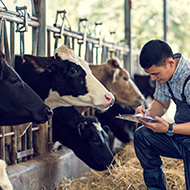Cattle vets announce new parasite policy

Parasite control in food-producing animals is full of challenges.
Plans to prioritise parasite control have been set out under a new policy announced by the British Cattle Veterinary Association (BCVA).
Parasite control in animals destined for human consumption is full of challenges - and endoparasiticide resistance is a serious threat that could damage the profitability and future health of the sector.
To help meet these challenges, the BCVA has developed a policy to help vets build the future of parasite control in livestock and support the long-term health of UK cattle. In the document, the BCVA outlines five key policy areas, including:
- Parasiticide (Anthelmintic) resistance in cattle and sheep
- Sustainability and soil health
- Safety & efficacy of parasiticides/anthelmintics and public perception
- Education and development of a new ethos
- Method of supply of parasiticides.
The policy sits alongside BCVA’s new sustainability statement and existing TB policy, with a focus on the role of the private farm vet and related industries.
Sally Wilson, who led the development of the policy alongside the BCVA Board, said: “We know that we need to encourage a shift from routine treatments to a diagnostic-led approach. BCVA is committed to contributing towards this shift.
“Our profession needs to be able to clearly demonstrate how clinicians balance the goal of preserving the effectiveness of parasiticides/anthelmintics with their health and welfare obligations to the animals under their care.”
BCVA president, Dr Elizabeth Berry added: “Training by the veterinary profession on medicine use with their clients has achieved considerable success recently, in both reducing and appropriate use of antimicrobials -around with initiatives like Farm Vet Champions taking this forward.
“Developing and extending this relationship with farm clients can lead to a similar focus on the use of parasiticides and we all need to be part of a change in attitude in use of parasiticides and consider animal health and our environment. We can be part of the solution.



 The Federation of Independent Veterinary Practices (FIVP) has announced a third season of its podcast, Practice Matters.
The Federation of Independent Veterinary Practices (FIVP) has announced a third season of its podcast, Practice Matters.